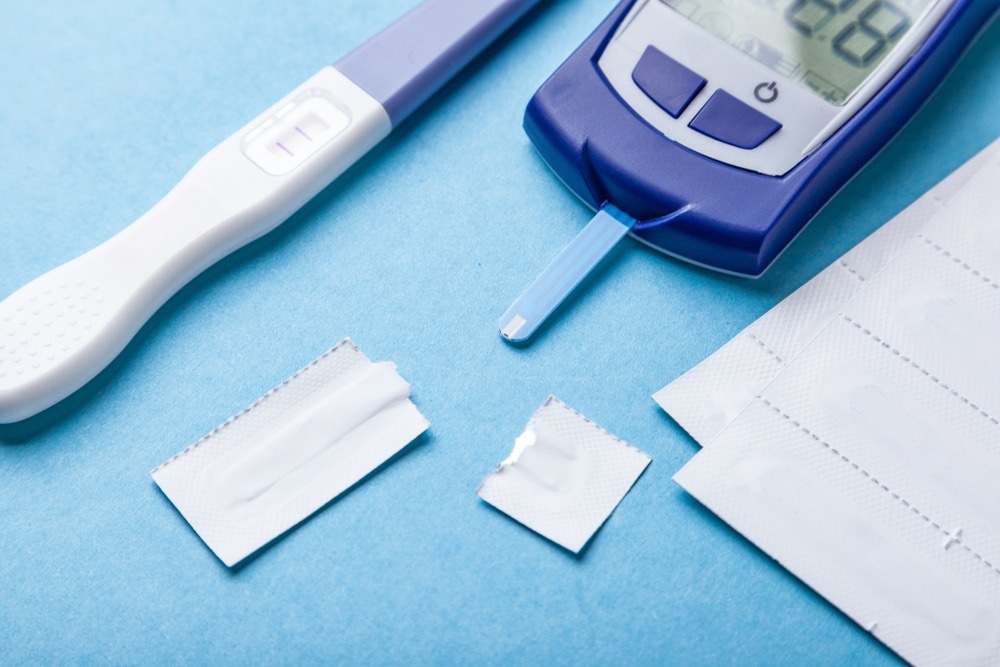Research has long established the occurrence of diabetes mellitus (DM) in pregnancy, whether new-onset in the form of gestational DM (GDM) or pre-existing, as a risk factor for future DM diagnosis.
The prevalence of DM within the first five months of the postpartum period is estimated to be up to 14% in women with a history of GDM. For this reason, postpartum screening of DM is recommended in these women.
Despite these guidelines, only about 40% of women with GDM in the United States are screened for DM postpartum. Therefore, a recent European Journal of Obstetrics & Gynecology study sought to determine which women with GDM are most likely to test positive for this condition postpartum in an effort to prevent persistent DM.

Study: Early pregnancy glycaemia predicts postpartum diabetes mellitus. Image Credit: ADragan / Shutterstock.com
Introduction
The American College of Obstetricians and Gynecologists (ACOG) recommends pregnancy screening for DM using an initial glucose challenge test (GCT) followed by an oral glucose tolerance test if GCT results are abnormal. However, this approach fails to distinguish between those with GDM and pre-existing DM or prediabetes.
According to the International Association of Diabetes in Pregnancy Study Group (IADPSG), the glycosylated hemoglobin (HbA1C) test is a superior diagnostic approach. Normal HbA1C is below 5.7%, while prediabetic values range between 5.7% and 6.4%.
The current study examined the value of HbA1C testing at the first prenatal visit in predicting prediabetes or postpartum DM. This study was conducted in a teaching hospital in a Hispanic-majority county, with routine HbA1C testing at the first visit for all pregnant patients.
All women in the study had been diagnosed with GDM by Carpenter-Coustan testing or DM due to HbA1C of 6.5% or greater at the first visit and had been tested postpartum for DM within one year. Postpartum testing at this center was through a 75 g oral glucose tolerance test (OGTT) between four and 12 weeks postpartum; however, HbA1C testing was also accepted after 12 weeks.
HbA1C levels exceeded the diabetic threshold at the first visit and were classified as pre-existing DM. For the current study, the diagnosis was validated if the first DM test during the next three years postpartum was positive for the condition.
The study included about 120 women with GDM or pre-existing DM, over 50% of whom had a normal early HbA1C. In addition to these women, 30% of the study participants had prediabetic values, while 15% had newly diagnosed DM.
Postpartum, about 20% of the study participants had a positive test for DM. These women had a higher body mass index (BMI) at a median of 35 kg/m2 compared to 30 for non-diabetic women. It is difficult to determine the significance of this finding, as pre-pregnancy values were unavailable for almost 45% of the DM group and 20% of the non-DM group.
Of the 22 diabetic women postpartum, almost 75% had an early pregnancy HbA1C above the diabetic threshold, with most of the remaining 25% having a prediabetic early HbA1C. Only one study participant had a typical value at this stage; however, this individual was diagnosed with postpartum DM within one year of childbirth.
Of the 65 women with an early normal HbA1C, only one later tested positive for DM postpartum with a negative predictive value (NPV) of 99%. However, about one-third of these women later developed postpartum prediabetes.
In contrast, almost one in seven study participants with a prediabetic result and 90% of those with a diabetic result had postpartum DM. Prediabetic early HbA1C values predicted postpartum prediabetes in over 40% of cases. A diabetic early HbA1C value indicates postpartum DM in 90% of cases.
Implications
In the current study, early pregnancy HbA1C testing showed a reliable correlation with postpartum DM. While two-thirds of women diagnosed with GDM had normal early HbA1C values, none of these women had postpartum DM within four to 12 weeks of giving birth. However, postpartum prediabetes occurs in one-third of women with a normal early HbA1C followed by GDM.
About 90% of those diagnosed with DM in pregnancy had persistent postpartum DM based on a high HbA1C. Interestingly, this validation of a well-known fact has not been performed in any earlier study. However, it is clinically important in that it allows for a diagnosis of type 2 DM in early pregnancy without the need for future testing.
Over 75% of women with newly diagnosed DM in pregnancy who tested positive in the postpartum period had undiagnosed DM prior to pregnancy. In addition, prediabetes at the onset of pregnancy that progresses to GDM is associated with a 13% risk of continuing diabetes postpartum. If possible, therefore, this group should be monitored to prevent overt diabetes through early postpartum lifestyle intervention.
The study findings help distinguish between existing DM in early pregnancy and true GDM in the absence of pre-pregnancy measurements of glucose tolerance, which is a rarity among healthy young women.
The ADA recognizes these limitations but continues to promote a complex risk-based screening strategy that may result in late diagnosis.”
Instead, the researchers suggest using universal HbA1C testing to detect glucose intolerance and DM in early pregnancy, thus enabling primary prevention postpartum. This is a simple and cheap test with better generalizability across ethnic barriers, with the ability to pick up both undiagnosed DM and a high risk for GDM while distinguishing between these two conditions. Moreover, a negative early HbA1C significantly reduces the risk of developing DM within the next year, even in women with GDM.
Adopting this strategy could help target women who benefit most from DM prevention and treatment during pregnancy and postpartum.
Journal reference:
- Callinan, C. E., Rockhill, K., Boe, B., & Heyborne, K. D. (2022). Early pregnancy glycaemia predicts postpartum diabetes mellitus. European Journal of Obstetrics & Gynecology and Reproductive Biology. doi:10.1016/j.ejogrb.2022.09.022.